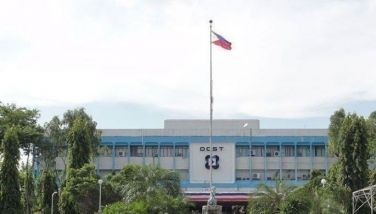Two more countries pledge support for proposed Asian Monetary Fund
December 2, 2006 | 12:00am
Support for the proposed Asian Monetary Fund (AMF) has been growing after two more countries "approved in principle" its creation, a ranking government official said.
The AMF is designed to help Asian countries in the event of another financial crisis similar to that which hit the region in 1997, when a number of businesses collapsed and currencies plummeted against the dollar.
House Speaker Jose de Venecia said Iran and South Korea have "approved in principle" the creation of the AMF.
"Beginning with Japan, the delegates from Iran and South Korea have proposed the need for Asian governments to consider the creation of an Asian Monetary Fund," De Venecia said.
He said this new development have paved the way for the scheduling of national consultations on the fund’s structure mechanics and time table.
De Venecia added he had informed the government’s economic managers – Bangko Sentral ng Pilipinas Governor Amando M. Tetangco, Finance Secretary Margarito B. Teves, Trade Secretary Peter Favila, and Energy Secretary Raphael Lotilla – on the recent development in the AMF.
In a meeting held at the Manila Golf in Makati City, De Venecia told the economic team to start preparing for the fund.
When asked if the AMF would clash with the International Monetary Fund (IMF), the House leader said the IMF should not resist the idea of an Asian counterpart because the proposal specifically states that it should not compete with but complement the work of the IMF.
The IMF is an international organization that oversees the global financial system by observing exchange rates and balance of payments, as well as offering financial and technical assistance when requested. Its headquarters are located in Washington, D
De Venecia said it is time that the region set up its own fund given that the combined reserves of developed Asian countries are larger than the G8 countries. The G8 countries are made up of the United States, United Kingdom, Japan, Germany, France, Italy, Canada and Russia.
China has the largest foreign currency reserves at $1 trillion while Japan has $800 billion in reserves. De Venecia likewise noted the rebound of the South Korean economies and the rise of India as a major economic power as an indicator of Asia’s growing financial strength.
The AMF is designed to help Asian countries in the event of another financial crisis similar to that which hit the region in 1997, when a number of businesses collapsed and currencies plummeted against the dollar.
House Speaker Jose de Venecia said Iran and South Korea have "approved in principle" the creation of the AMF.
"Beginning with Japan, the delegates from Iran and South Korea have proposed the need for Asian governments to consider the creation of an Asian Monetary Fund," De Venecia said.
He said this new development have paved the way for the scheduling of national consultations on the fund’s structure mechanics and time table.
De Venecia added he had informed the government’s economic managers – Bangko Sentral ng Pilipinas Governor Amando M. Tetangco, Finance Secretary Margarito B. Teves, Trade Secretary Peter Favila, and Energy Secretary Raphael Lotilla – on the recent development in the AMF.
In a meeting held at the Manila Golf in Makati City, De Venecia told the economic team to start preparing for the fund.
When asked if the AMF would clash with the International Monetary Fund (IMF), the House leader said the IMF should not resist the idea of an Asian counterpart because the proposal specifically states that it should not compete with but complement the work of the IMF.
The IMF is an international organization that oversees the global financial system by observing exchange rates and balance of payments, as well as offering financial and technical assistance when requested. Its headquarters are located in Washington, D
De Venecia said it is time that the region set up its own fund given that the combined reserves of developed Asian countries are larger than the G8 countries. The G8 countries are made up of the United States, United Kingdom, Japan, Germany, France, Italy, Canada and Russia.
China has the largest foreign currency reserves at $1 trillion while Japan has $800 billion in reserves. De Venecia likewise noted the rebound of the South Korean economies and the rise of India as a major economic power as an indicator of Asia’s growing financial strength.
BrandSpace Articles
<
>
- Latest
- Trending
Trending
Latest
Trending
Latest
Recommended




























